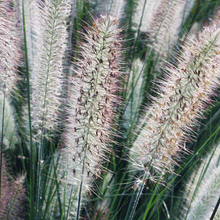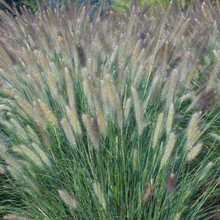Pennisetum 'Foxtrot' is a bold ornamental grass known for its showy bottlebrush like plumes that emerge in mid to late summer. The arching foliage forms a lush cascading mound that adds movement and texture to mixed borders and naturalistic plantings. It maintains a strong upright habit and displays excellent drought tolerance once established making it a favorite in low maintenance and xeriscape gardens.
Height & Spread: 36 - 48 in x 24 - 36 in
Bloom Time: Mid to late summer
Light Requirements: Full sun
Soil Preference: Well drained soil; adaptable to poor or sandy conditions
Watering Needs: Low once established
Deer Resistance: Seldom browsed by deer due to coarse texture
Native Status
Pennisetum 'Foxtrot' is a cultivated ornamental grass, developed from species native to Africa and Asia. While not native to North America, it performs reliably in temperate climates.
WILDLIFE & INSECTS
Birds
- Seed heads provide seasonal food for small songbirds such as finches and sparrows in late fall and winter.
Beneficial Insects
- Dense foliage creates microhabitats for predatory beetles, spiders, and overwintering insect species that help control garden pests.
Spacing & Landscape Use
Spacing Recommendations:
- Space 24 - 36 in apart to allow for full arching form and airflow between plants.
Landscape Placement:
- Excellent for use as a backdrop in perennial beds, mass plantings in modern landscapes, or as a standalone specimen in gravel gardens.
Companion Plants
- Echinacea purpurea 'Magnus' - Tall daisy like flowers in magenta provide a striking contrast against the flowing grass plumes.
- Agastache foeniculum 'Blue Fortune' - Upright lavender blue flower spikes attract pollinators and echo the vertical form of Pennisetum.
- Perovskia atriplicifolia (Russian Sage) - Airy texture and silver foliage cool the palette and create contrast with the warm toned plumes.
- Coreopsis verticillata 'Moonbeam' - Soft yellow flowers bloom all summer and complement the grass’s fine texture.
- Salvia nemorosa 'Caradonna' - Deep violet flower spikes accentuate the movement and height of the grass in full sun plantings.



